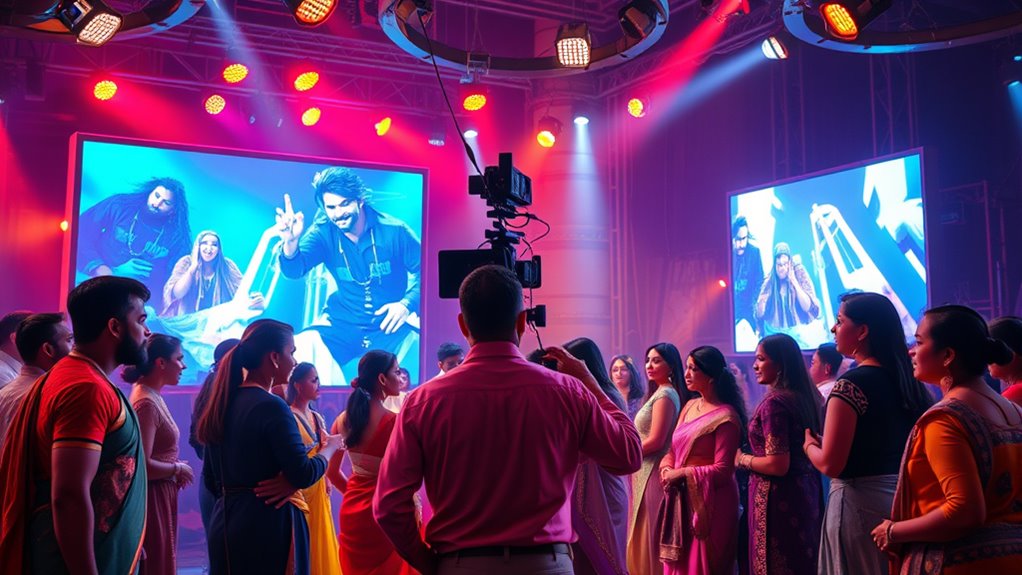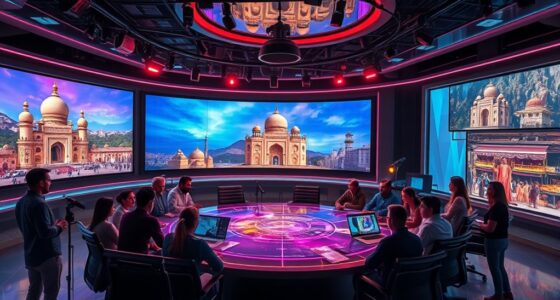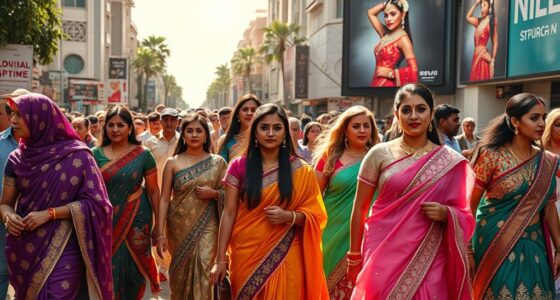In 2025, AI is revolutionizing Bollywood by streamlining production, enhancing storytelling, and creating virtual characters and immersive visual effects. It helps predict audience preferences, automates editing, and deepens creativity with CGI and AI-generated scripts. While industry challenges like ethical concerns and talent gaps exist, ongoing innovations are pushing boundaries. If you continue exploring, you’ll discover how these advancements are shaping the future of Indian cinema in remarkable ways.
Key Takeaways
- AI is revolutionizing Indian cinema by enhancing visual effects, scriptwriting, and immersive storytelling techniques.
- Advanced AI tools enable faster production workflows and innovative content creation in Bollywood.
- AI-generated characters and stars are emerging, reducing reliance on traditional actors.
- Market analysis and audience data analytics help tailor content to viewer preferences.
- Ethical and regulatory frameworks are evolving to ensure responsible AI integration in filmmaking.
Transforming Film Production With AI Technology
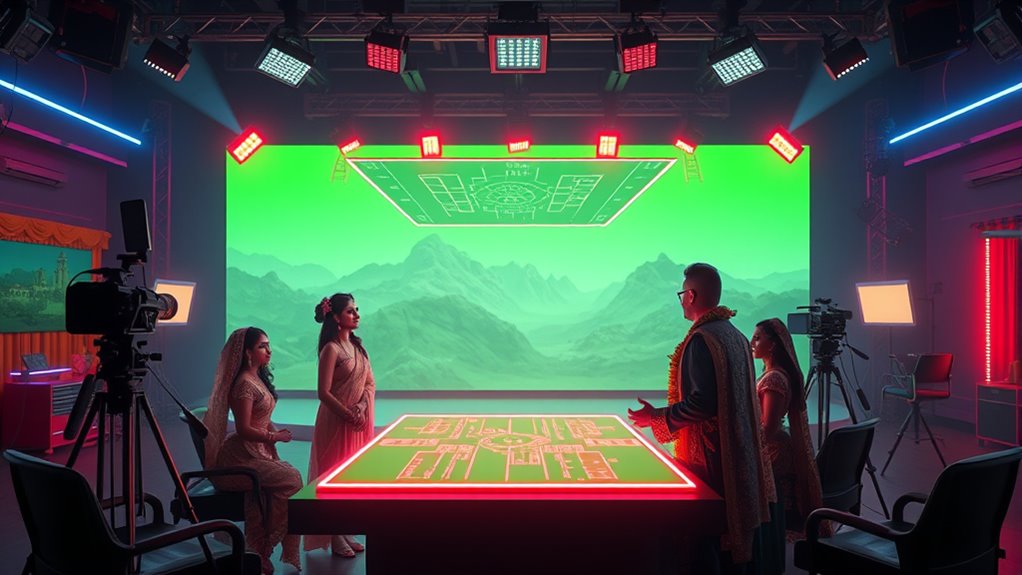
AI is revolutionizing film production in Bollywood by streamlining every stage, from pre-production to post-production. During pre-production, AI analyzes scripts to gauge audience engagement and predict box office success, helping you make smarter decisions. It also optimizes casting by analyzing actor profiles and past performances, saving time and improving choices. AI enhances resource allocation, ensuring you use your budget efficiently. Scheduling becomes more precise with AI, reducing delays and costs. Market analysis tools evaluate trends to guide strategic planning. In production, AI assists with virtual cinematography, optimizing camera angles, lighting, and virtual actors. It predicts potential risks, offering solutions before issues arise. Additionally, AI can help maintain emotional support during stressful production phases by providing insights into audience reactions and emotional engagement. Furthermore, AI-driven environmental considerations ensure sustainable practices are integrated into the filmmaking process, minimizing ecological impact. Leveraging AI-powered content clustering can help teams organize vast amounts of footage and creative assets, streamlining the editing process and enhancing overall production efficiency. Integrating appliances with smart home technology can also facilitate efficient management of production facilities and set environments. Moreover, AI can analyze filming locations to determine the best settings that match the creative vision, saving time and resources. Overall, AI makes the entire filmmaking process faster, more efficient, and cost-effective, transforming how Bollywood movies are made.
Enhancing Creativity and Storytelling Through AI Tools
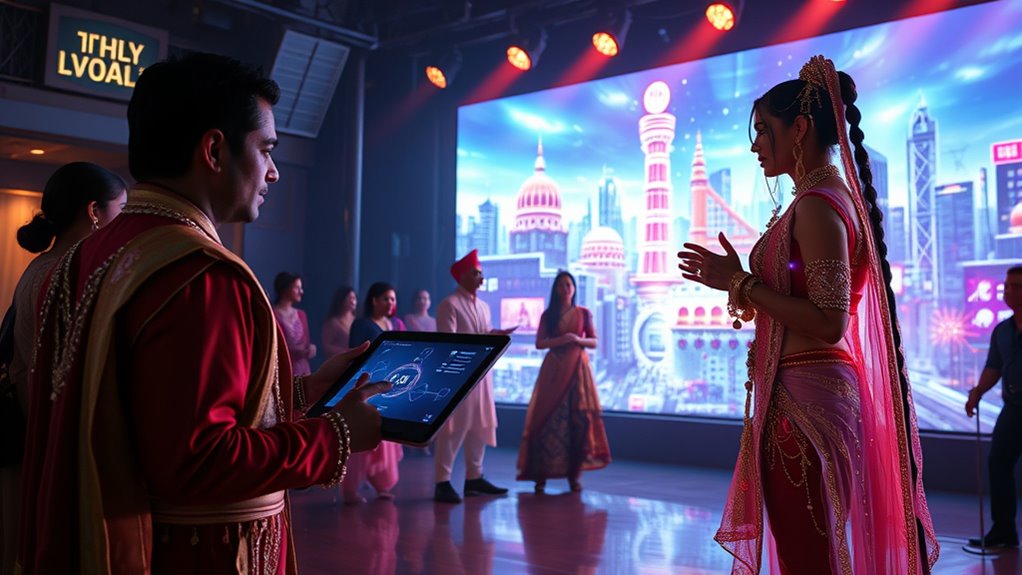
By integrating advanced AI tools into the creative process, Bollywood filmmakers are opening new frontiers in storytelling and visual expression. You can now craft narratives featuring AI-generated characters like Naisha Bose and Zain Kapoor, exploring themes of identity, love, and technology. Entire virtual protagonists navigate diverse settings, adding emotional depth and complex relationships. AI-driven visual effects produce stunning imagery, from realistic cityscapes to fantastical landscapes, while AI creates atmospheric sequences that heighten immersion. Additionally, AI helps generate story concepts, craft authentic dialogues, and visualize scenes rapidly, streamlining pre-production. Storytelling techniques are evolving as AI enables more nuanced and personalized narratives, pushing the boundaries of traditional filmmaking. The use of visual effects and CGI technology allows filmmakers to craft immersive worlds that captivate audiences in unprecedented ways. Unique and Wicked Planters demonstrate how innovative uses of technology can enhance creative projects; similarly, AI is transforming filmmaking. Films like Naisha demonstrate AI’s potential to revolutionize filmmaking, inspiring both innovation and debate within the industry. Sound and music benefit too, with AI composing scores and automating sound design, enhancing emotional impact. This synergy of technology and creativity empowers filmmakers to push artistic boundaries and tell more innovative, emotionally resonant stories. Moreover, leveraging digital tools and machine learning algorithms can optimize production workflows and audience engagement strategies. As entertainment venues like cinemas and theme parks adopt AI for personalized experiences and improved operations, the integration of AI in filmmaking reflects broader industry trends toward technological innovation.
Addressing Ethical Concerns and Industry Challenges
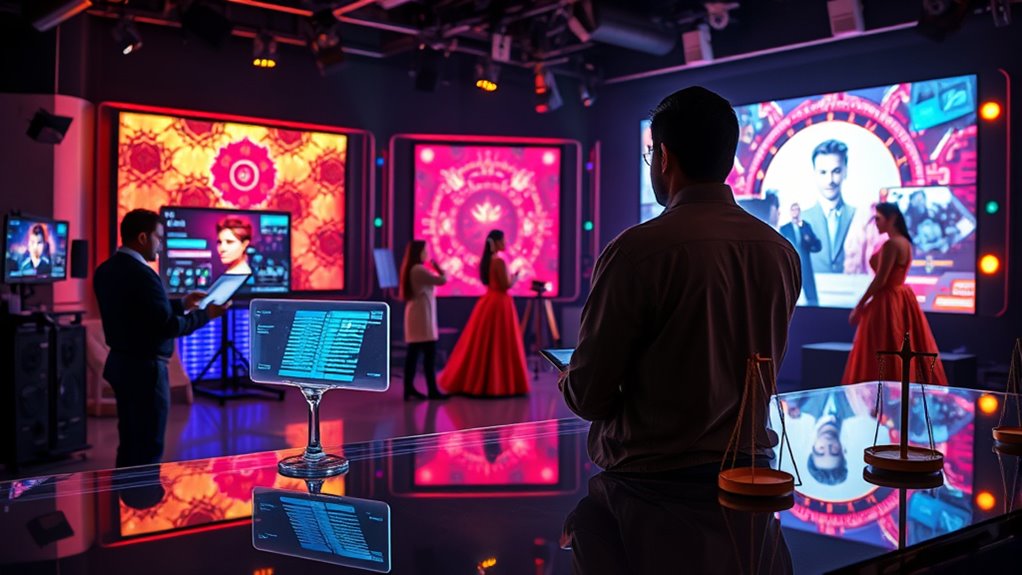
As Bollywood integrates advanced AI technologies, addressing ethical concerns and industry challenges becomes essential to guarantee responsible innovation. You need clear strategies to navigate this evolving landscape. Key issues include establishing AI ethics boards, like Studio Blo’s led by Shekhar Kapur, to oversee responsible use. Ethical debates focus on restoring classics without compromising original intent, avoiding AI misuse—such as replacing stars—and creating guidelines that protect artistic integrity. Managing challenges involves investing wisely, collaborating with global agencies, and balancing innovation with tradition. Priorities also include ensuring cultural sensitivity and developing regulatory frameworks. Recognizing the importance of AI ethics guidelines in maintaining artistic integrity is crucial for sustainable progress. Additionally, fostering AI trustworthiness through continuous monitoring and safety measures is vital to prevent misuse and uphold industry standards. Implementing credit card security measures can serve as a benchmark for safeguarding AI-driven solutions, ensuring data protection and public trust. Moreover, integrating collaborative innovation from diverse global partners can help address complex technological and ethical issues more effectively. Building transparent AI governance frameworks will further enhance accountability and public confidence in AI applications across Bollywood.
Overcoming Barriers to AI Adoption in Bollywood
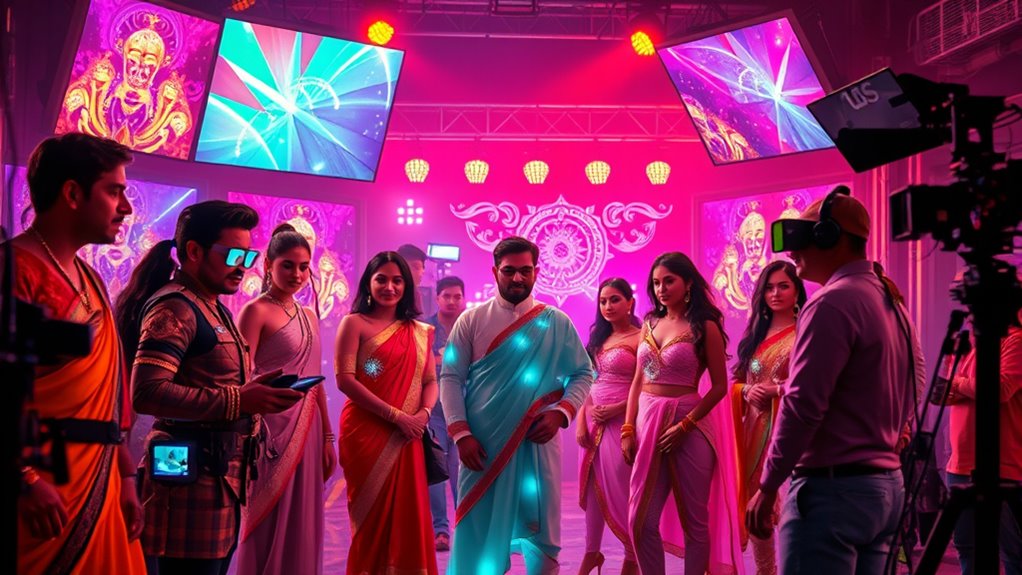
Despite the growing potential of advanced technologies, Bollywood faces significant hurdles in adopting AI effectively. Talent shortages and skill gaps hinder progress, as India’s limited pool of AI professionals struggles to keep pace with rapid tech updates. Data quality issues and insufficient film-related datasets slow AI model training, risking biased or inaccurate outputs. Data standardization remains a challenge, affecting the reliability of AI-driven insights. Infrastructure barriers, like uneven cloud adoption and regulatory uncertainties, further delay projects. High costs and uncertain ROI cause smaller studios to hesitate, while cultural resistance from traditional filmmakers hampers change. To address these challenges, partnerships with academic institutions are emerging, and investments in data and infrastructure are underway. Overcoming these barriers requires strategic focus on skill development, data standardization, and fostering innovation. Additionally, integrating private placement strategies can help fund AI initiatives more effectively across the industry. Improving training programs to develop specialized AI talent is also crucial for long-term success.
Looking Ahead: The Future of AI-Driven Filmmaking
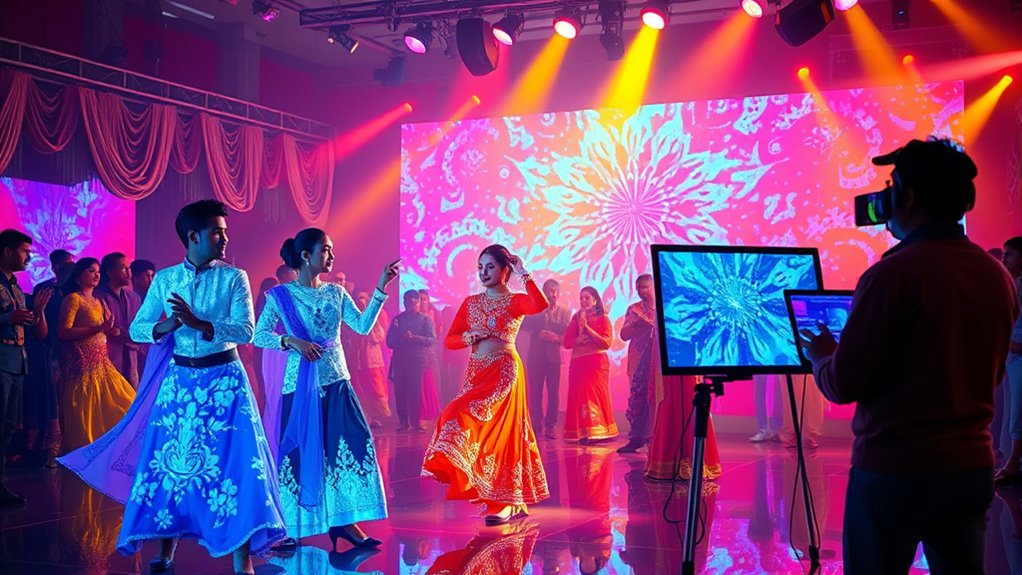
The future of AI-driven filmmaking promises to transform how stories are created and experienced. You’ll see AI generate characters, making stars without relying solely on top talent. De-aging techniques will become more seamless, allowing for realistic portrayals of actors at different ages. Storyboarding will be automated, speeding up pre-production, while AI-generated soundtracks will blend digital and human creativity. Costs will drop as AI optimizes processes and automates tasks. Additionally, the integration of industry-specific regulations will ensure ethical standards are maintained as AI becomes more prevalent in filmmaking. This evolving landscape will also necessitate ongoing ethical considerations to address concerns about AI’s impact on employment and authenticity. You can expect:
- AI-enhanced visual effects, making characters and scenes more realistic
- Advanced scriptwriting and dialogue generation, boosting creativity
- AI-powered studios driving faster, more innovative content creation
- AI adoption will be seen as a major technological shift in Indian cinema, with filmmakers increasingly integrating these tools into their workflows. This integration will also facilitate the use of organic and natural juices as part of creative promotional campaigns and behind-the-scenes content, offering a fresh way to connect with audiences. Furthermore, the adoption of advanced technologies will enable filmmakers to explore new storytelling formats and immersive experiences, pushing the boundaries of traditional cinema. Additionally, leveraging data analytics can help filmmakers better understand audience preferences and tailor content accordingly.
Frequently Asked Questions
How Do AI Tools Impact Traditional Bollywood Acting Techniques?
AI tools considerably impact traditional Bollywood acting techniques by enhancing your capabilities. You can use AI for de-aging, voice cloning, and creating digital characters, expanding storytelling possibilities. AI streamlines tasks like storyboarding and script analysis, allowing you to focus more on your craft. It also offers new ways to evoke emotions and connect with audiences, but you must balance innovation with ethical considerations about AI replacing human actors.
What Training Is Available for Filmmakers to Learn AI Integration?
Imagine you’re in a future where AI training is as common as learning to ride a bike. You can explore courses like Curious Refuge’s mini-course on AI filmmaking, or enroll in Franklin University’s integrated program. NYU’s virtual production classes teach you to master AI video tools, while other platforms offer workshops on scriptwriting and art direction. These opportunities equip you with the skills to seamlessly blend AI into your filmmaking journey.
How Does AI Influence Regional and Indie Film Productions in India?
You see how AI transforms regional and indie films in India by lowering costs and boosting creative freedom. It lets you create Hollywood-quality visuals, even with limited budgets, making storytelling richer. You can craft immersive scenes from local stories, dialects, and cultures, reaching global audiences. AI empowers you to experiment with genres and visuals without needing a big studio, opening doors for diverse voices and innovative filmmaking.
Are There Legal Frameworks Governing Ai-Generated Content in Bollywood?
You wonder if there are legal frameworks governing AI-generated content in Bollywood. Currently, there aren’t specific laws directly addressing AI or AI-created works. Laws from the past don’t cover AI’s complexities, leading courts to fill gaps case-by-case. This uncertainty affects rights, ownership, and copyright issues. As AI advances, Bollywood faces a pressing need for clearer regulations to protect artists, creators, and industry interests against AI’s evolving influence.
How Do Audiences Perceive Ai-Created Characters and Storylines?
You see that audiences have mixed feelings about AI-created characters and storylines. Some connect emotionally if they’re compelling, viewing them as an evolution rather than a replacement. Others are hesitant, preferring traditional storytelling and human actors. You notice that fan engagement with virtual influencers shows potential, but cultural nuances matter. Overall, audiences are curious and open but still need convincing about AI’s role in creating authentic cinematic experiences.
Conclusion
As AI continues to revolutionize Bollywood, it’s like a new brushstroke on the canvas of filmmaking. You’re at the forefront of a creative renaissance where technology and imagination dance together. While challenges remain, embracing AI’s potential promises a future where stories are richer, visuals sharper, and possibilities endless. So, keep pushing boundaries—because in this evolving landscape, you’re shaping the next chapter of cinematic history.
